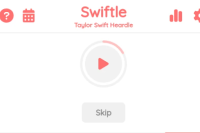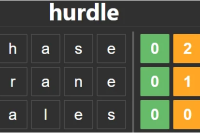
Play Other Games








scholardle
Scholardle is a word puzzle game that takes the foundation of Wordle and infuses it with an academic flair. In this game, players aim to uncover a five-letter academic word, making it an educational
What is Scholardle?
Scholardle is a word puzzle game that takes the foundation of Wordle and infuses it with an academic flair. In this game, players aim to uncover a five-letter academic word, making it an educational and intellectually stimulating experience.
Rules
Academic Word Guessing: The primary objective in Scholardle is to guess a five-letter academic word. Players have six chances to correctly decipher this word.
Difficulty Level: Scholardle is known for its elevated difficulty compared to the original Wordle. Players must employ a combination of linguistic knowledge, deductive reasoning, and strategic thinking to succeed.
Hints and Strategies: To improve your Scholardle skills, you can leverage hints and strategies that help you make more educated guesses and decipher the academic word.
Features
Educational Gameplay: Scholardle goes beyond typical word games by introducing academic words into the mix. It's a fantastic way to expand your vocabulary while enjoying a challenging puzzle.
Increased Difficulty: Scholardle is designed to provide a tougher wordplay challenge than Wordle. It's ideal for players who want to push their word-guessing abilities to the limit.
Hints and Strategies: Scholardle offers hints and strategies to help players improve their performance. These tools are invaluable for players looking to enhance their word-guessing skills.
Brain Workout: Scholardle is not just a game; it's a mental workout that stimulates your critical thinking and problem-solving abilities. It's perfect for those seeking a cerebral challenge.
Educational Benefits: Playing Scholardle regularly can expand your academic word repertoire and boost your overall vocabulary. It's an enjoyable way to enhance your language skills.
How to Play Scholardle
Start by guessing a five-letter academic word within the allotted six chances.
Pay attention to the feedback provided after each guess. Letters that are in the word and correctly placed are highlighted in one color, while letters that are in the word but not in the right position are highlighted in another color. Letters not in the word are not highlighted.
Use this feedback to refine your subsequent guesses, eliminating unlikely letters and focusing on those that are part of the academic word.